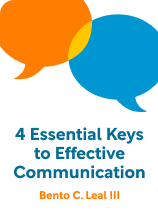

This article is an excerpt from the Shortform book guide to "4 Essential Keys to Effective Communication" by Bento C. Leal III. Shortform has the world's best summaries and analyses of books you should be reading.
Like this article? Sign up for a free trial here.
What are empathic listening skills? How can you listen with empathy?
Empathy requires you to give the other person your undivided attention. In 4 Essential Keys to Effective Communication, Bento C. Leal recommends three practices to develop your empathic listening skills.
Keep reading to learn how to engage in conversations by listening.
Listen With Empathy
Empathic listening skills have three components: giving the other person your undivided attention, gaining an accurate understanding of their perspective, and making them feel heard and understood.
Leal explains that if you’re unable to listen to another person with empathy, it’s impossible to gain an accurate and complete understanding of their perspective. This prevents you from being able to respond to them appropriately (a key element of Ability #3) and reach a satisfactory end to the conversation.
When we fail to listen to another person empathetically, we’re likely to engage in communication practices that damage our relationship, such as:
- Interrupting the other person or finishing their sentences because we think we know what they’re going to say
- Providing unsolicited advice when the other person actually needs support
- Responding in a way that diminishes the other person’s feelings or experiences
- Responding to a minor point rather than the main idea and going off-topic
| Perspectives on Empathic Listening The concept of empathic listening was largely popularized by Stephen Covey’s The 7 Habits of Highly Effective People, in which, like Leal, Covey argues that empathic listening is the highest and most effective form of listening. Covey also agrees that the purpose of empathic listening is to truly understand people and make them feel “heard” before responding to what they have to say. However, Covey goes more in-depth in his discussion of effective listening than Leal. He elaborates that there are four phases of listening that come before empathic listening. The negative outcomes of poor listening that Leal discusses seem to align with certain listening “phases” that Covey discusses: 1) Ignoring the other person: simply thinking about other things and tuning the other person out. This could result in you interrupting the other person or providing unsolicited advice because you mistakenly think you know what’s going on. 2) Pretending to listen: nodding along as if you’re listening, but your mind’s elsewhere. This stage of listening could arguably lead to you diminishing the other person’s feelings. If you’re only pretending to listen to someone who’s expressing sensitive emotions, you’re unlikely to respond with the support that they need from you. 3) Selectively listening: listening to bits and pieces that catch your attention but not the big picture. This stage of listening could arguably lead to directing the conversation off topic or providing unsolicited advice. If you’re only listening to the pieces of information you find interesting, you’re unlikely to grasp the context of the discussion and respond appropriately. 4) Attentively listening: paying attention to what the other person is saying, but simply repeating their words back to them without processing and reflecting on them. This could lead you to either respond in a way that diminishes the other person’s experience or direct the conversation off topic by focusing on a minor point rather than the big picture. |
Leal recommends three main practices to avoid the negative outcomes of poor listening and instead listen to others with empathy:
Practice #1: Clear Your Mind of Thoughts
Leal explains that the biggest issue that prevents us from giving our undivided attention to others is getting distracted by our own thoughts. As a result, the first practice in listening with empathy is to clear your mind of everything except for what the other person is saying. This means ignoring thought impulses like what you’re going to do after work, whether the other person is right or wrong, or how you’re going to respond.
(Shortform note: While Leal recommends practicing empathic listening by clearing your mind of thoughts and focusing solely on the other person, this advice may be difficult for people with disorders like ADHD to apply. These individuals often experience disruptive thoughts and struggle to stay focused on one thing at a time. Experts provide a few additional recommendations for these individuals that will make Leal’s advice easier to follow. For example, if you’re struggling to clear your mind of impulsive thoughts, visualize the details of what the other person’s saying—create a movie in your mind. This will help you stay engaged. You can also take notes if it’s appropriate or practical.)
Practice #2: Focus on Their Words and Body Language
Next, you must pay close attention to the other person’s choice of words, tone of voice, and body language so you can gain the most complete understanding of their perspective. Leal explains that these signals reveal their true thoughts and feelings.
For example, if someone says that they’re “infatuated” with their new partner, it doesn’t just mean that they “like” them—it means that they’re experiencing a short-term obsession and have probably been thinking about them nonstop. Similarly, if someone says that they’re “infatuated” with their new partner in a nervous tone of voice while knitting their eyebrows, this indicates that they’re probably concerned about their infatuation.
Practice #3: State Your Understanding
Once you’ve gained a complete and accurate understanding of the other person, express and clarify that understanding by vocalizing it, Leal states. To do this, rephrase and summarize the other person’s words and feelings and share your interpretation with them. It’s important to mimic their tone and body language while doing this—for example, if they seem upset, use a serious tone while responding. This will ensure that you’re being sensitive to the emotions they’re experiencing.
To illustrate this, consider the previous example of your friend expressing concern over their infatuation in a new relationship. With a concerned tone, you can say something like, “It sounds like you’re feeling a bit concerned about how this intense new relationship is affecting you.”

———End of Preview———
Like what you just read? Read the rest of the world's best book summary and analysis of Bento C. Leal III's "4 Essential Keys to Effective Communication" at Shortform.
Here's what you'll find in our full 4 Essential Keys to Effective Communication summary:
- How to avoid the two most damaging communication faux pas
- How to listen and express yourself with empathy
- Why having empathy for others starts with seeing the worth in yourself






